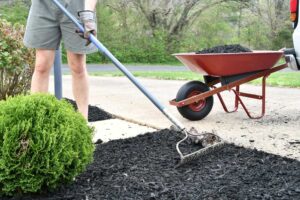Raking up heaps and heaps of leaves into big, jumpable piles. It makes a beautiful and nostalgic picture, doesn’t it?
However, when it comes to disposing of all those leaves and of the other outdoor and green waste generated in a typical community, the picture isn’t as pretty. When green waste goes to landfills instead of being disposed of in other more responsible ways, it releases methane gas which can be damaging to the environment.
As a city or community leader, you have an opportunity through your platform to encourage better green waste processes in your area. We’ve put together some ideas on how you might be able to earn better buy-in from residents and local businesses as you build your green waste processing program.
What Is Green Waste and How Can We Encourage Our Communities to Manage it Better?
Green waste is organic and biodegradable waste, typically derived from plants. Some examples of green waste that might be produced in your local community include:
- Grass clippings
- Brush
- Tree branches
Christmas trees, while technically a form of green waste, are typically too large for green waste bins. However, waste processing providers will frequently offer other recycling options for large living holiday décor in order to keep it out of landfills.
In addition to yard waste items, soiled paper (like pizza boxes, paper plates, paper towels and more) can typically be included in green waste. Food items may not be considered green waste, but should also be managed in more responsible ways, like composting, rather than going straight into landfill.
To get people thinking about the right ways to manage their waste, you need to offer them a unique blend of education, encouragement and convenience.
1. Educate your community.
Green waste may not be a well-known concept to residents in your area. They may not understand how to secure a green waste bin or which items are suitable for green waste processes.
The best way to get them to actively participate in responsible green waste processing is to start providing them with education. Students in local schools can start learning about green waste processing and can share that information at home.
Print and digital awareness campaigns can highlight green waste options in your community. You can partner with local businesses to highlight waste processing options and promote additional awareness.
And, just keeping information upfront and available can be helpful. If people don’t know which bin their items should go in (waste, recycling or green waste), they’re likely to just go with the safest option and opt for the waste bin.
Give them an easy way to check their waste processing options, like an online or app-based “What Goes Where?” guide, so they can ensure they’re doing things the right way. If they feel knowledgeable and confident, managing green waste properly will be become a habit instead of a chore.
2. Use technology to remind and to drive awareness.
As mentioned, awareness campaigns can be helpful. Giving people frequent reminders through their most-used technology can also help. Most Americans check their mobile phones close to 100 times a day and consider their phone their #1 necessity.
If your city’s residents are checking their phone for the hundreds of other products and businesses they interact with daily, you should be there as well. Make it easier for them to do the right thing and handle their waste in the right way.
3. Share the data.
Americans are running ragged with heavy workloads and family responsibilities. Asking them to handle one more abstract task –especially when it comes to household chores –is just adding to their mental load and overall exhaustion.
What can make the difference? Giving them the data and the facts on how the choices they make will make a difference. This falls into a similar bucket with the idea of providing education to encourage good green waste decision making.
People want to feel like they’re a part of something bigger. 88 percent of consumers say they want the companies and organizations they work with to show them how to do a better and more ethical job of taking care of their communities.
As your program takes off, consider partnering with your waste processing provider to “go behind the scenes” and show the process and the difference that’s being made with more responsible management of green waste. Provide bulletins and updates that show the impact improved green waste processing is making for the community, as well as in the larger area.
4. Partner with a knowledgeable green waste processing provider.
Choosing the right partner is critical to launching any successful program. You want to choose a waste processing partner that is experienced and that has implemented successful green waste processes in other municipalities.
These companies will have experience rolling out the right messaging to your residents, as well as finding ways to get your local businesses on board with similar processes. For example, if a waste processing company is already offering green builder solutions, they’ll have the relationships and the know-how to get builders and other businesses on board with more efficient green waste processes.
As more cities adopt zero-waste ordinances, the pressure will be on to encourage residents to make the right choices when managing the items they discard.
Another positive incentive might be providing green waste bins at a flat rate, rather than charging extra for the additional bin. This option frees up space in the more frequently used waste bin and makes the process of managing green waste a little more frictionless and easier to incorporate into a typical routine.
When you’re responsible for leading the charge on green waste, you want to ensure you’re creating a system that works and that makes your community more sustainable. As you launch or enhance your green waste processes, let us provide support to educate and encourage your residents/community to manage their waste properly.




